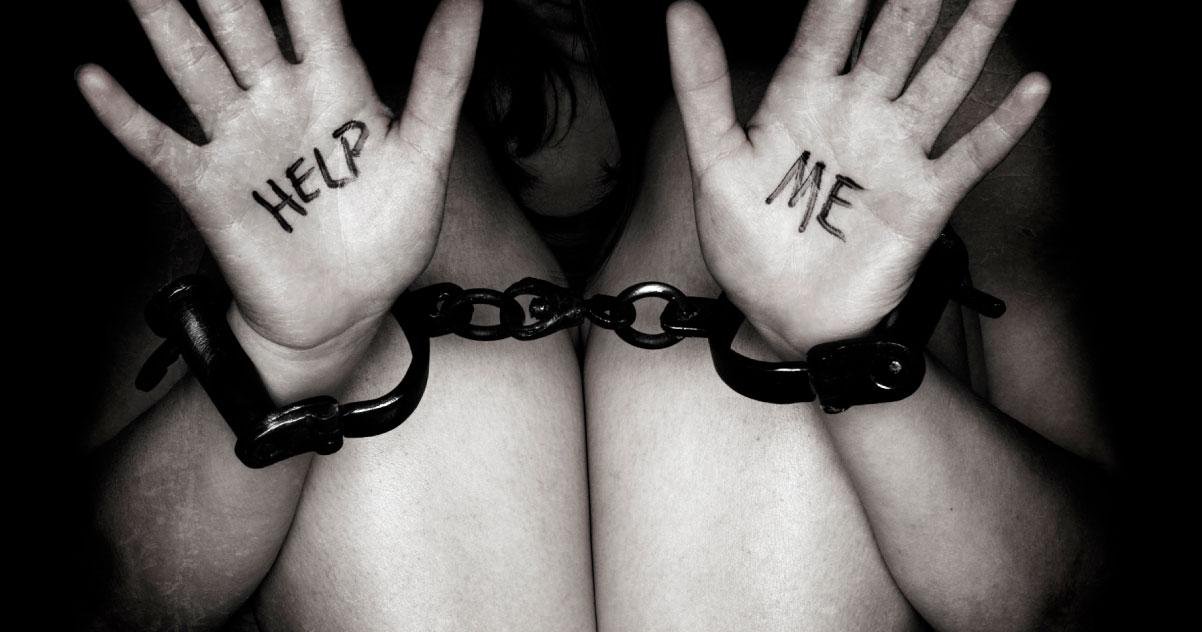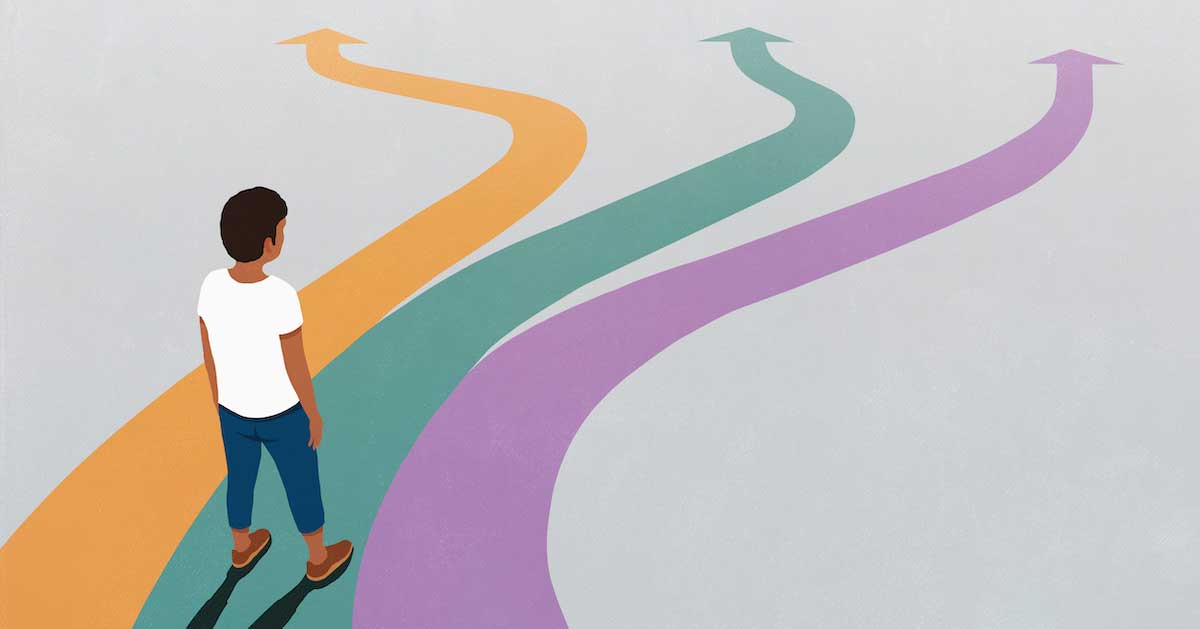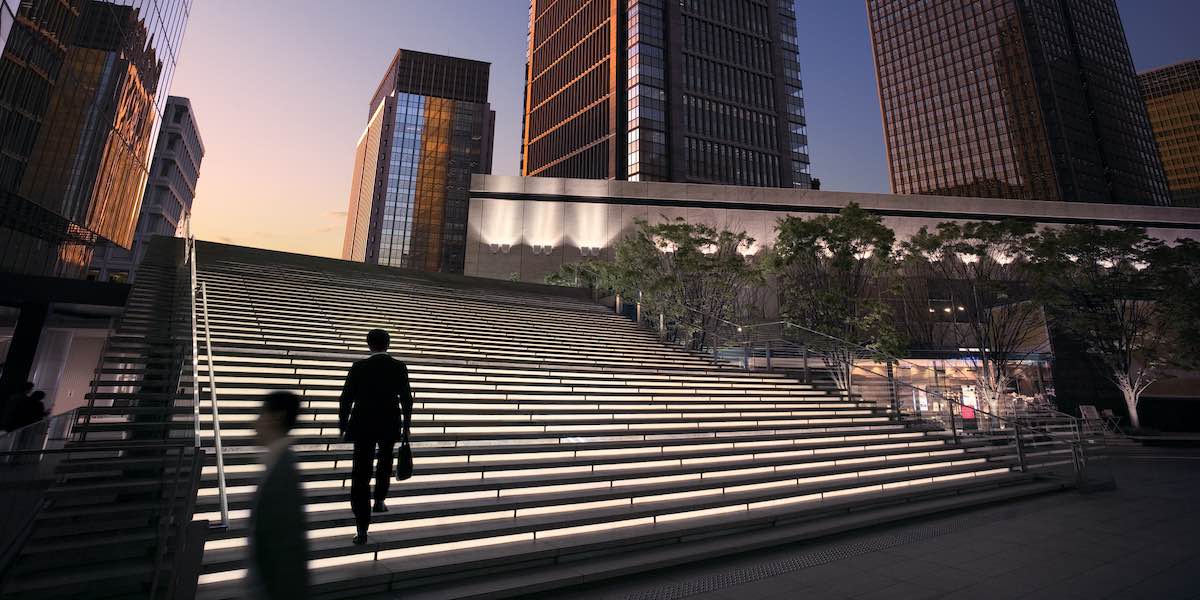When Maritz Global Events first got involved in fighting human trafficking in 2012, President David Peckinpaugh turned to Google and Bing to research the subject.
“The first picture that came up was a picture of a young woman being trafficked—in a hotel room in the city of St. Louis,” says Peckinpaugh, whose office is in the Greater St. Louis area. “That hit me between the eyes. It really is a domestic issue.”
Maritz—which runs an 80-employee steering committee to fight human trafficking—is among a growing contingent of meeting and hospitality companies that are prioritizing the fight against this abuse. Human trafficking is defined as the buying and selling of people. While many people think of sexual exploitation when they hear the phrase, it also extends to crimes such as organ trafficking and forced labor.
In response to industrywide concern about human trafficking, MPI recently invited Sister Kathleen Bryant, a Religious Sister of Charity from Los Angeles and a member of the board of directors of U.S. Catholic Sisters Against Human Trafficking, to address the subject at the staff All Team Summit in December.
“There is a growing momentum around the hospitality industry between hotel managers and conference planners to do something and to be leaders in terms of fighting some of the trafficking that goes on, especially for children,” Bryant says.
An estimated 21 million people around the world are exploited in human trafficking, according to UNICEF. Although many people believe it is confined to developing economies where predators take advantage of impoverished people, traffickers have a foothold around the world. In the U.S., for instance, 7,572 cases of trafficking were reported to the National Human Trafficking Hotline in 2016, up 35.7 percent from 2015.
Many experts say human trafficking is getting easier by the day, thanks to criminals’ access to communications tools such as the internet and social media and the growing ease of global travel. And they are calling upon travel and tourism industry professionals to do what they can to stop the practice.
“Despite 20 years of efforts, the sexual exploitation of children in travel and tourism has expanded across the globe and out-paced every attempt to respond at the international and national level,” notes Offenders on the Move: Global Study on Sexual Exploitation of Children in Travel and Tourism 2016, published by ECPAT International and Defence for Children-ECPAT Netherlands. ECPAT is a nonprofit dedicated to ending the commercial sexual exploitation of children.
One reason it’s hard to stop human trafficking is it’s a lucrative business, where crimes often go unreported and their perpetrators unpunished. The International Labor Organization estimates that profits from human trafficking and forced labor hit US$150 billion annually.
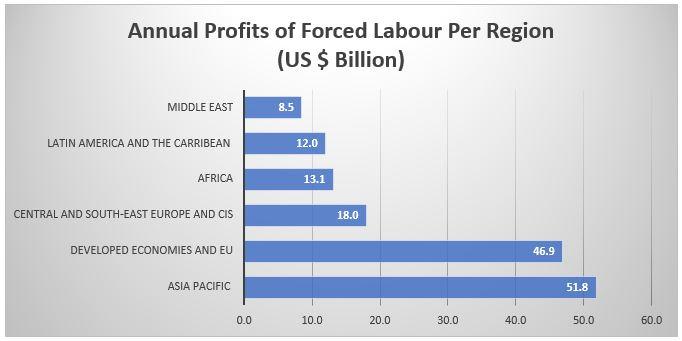
Source: International Labour Organization
Although the lack of progress in fighting human trafficking has been discouraging, initiatives such as Human Trafficking Awareness Month (January) have been helping to raise awareness in the meeting and travel industries and beyond. The U.K. Modern Slavery Act 2015 also brought the issue to the forefront. The law, which covers many multinationals—including U.S. companies with U.K. operations—requires disclosure of the efforts companies are making to eliminate slavery and human trafficking from their supply chains.
Big travel and hospitality companies are also taking measures that have helped move the conversation forward. For instance, in 2011, Delta Air Lines was the first airline to sign the “End Child Prostitution, Pornography and Trafficking Code of Conduct.” The airline, which runs a program called #GetOnBoard to stop human trafficking, has now trained more than 54,000 employees to identify the signs of such exploitation. Delta has also supported anti-trafficking legislation in the U.S. and partnered with Polaris, an anti-trafficking group that operates the National Human Trafficking Hotline, with the airline providing a $1 million sponsorship.
Maritz is among more than 300 tourism companies that have joined a multi-stakeholder initiative called “The Code of Conduct for the Protection of Children from Sexual Exploitation in Travel and Tourism.” The program provides support, guidance, examples of best practices and online tools to members of the industry who have signed on.
ECPAT Sweden developed “The Code” following the first World Congress Against Commercial Sexual Exploitation of Children in 1996, working in partnership with the United Nations World Tourism Organization (UNWTO) and several Swedish tour operators. In 2004, The Code became an independent nonprofit organization.
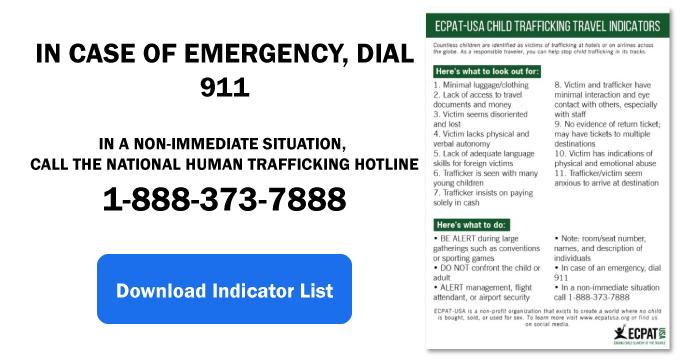
Source: www.ecpatusa.org
The Code aims to create a well-trained tourism industry that can recognize and prevent potential abuse and build “zero tolerance” environments where travelers understand that human trafficking is unacceptable and offenders will be prosecuted.
In addition to Maritz Global Events, The Code has been adopted by U.S.-based companies such as Carlson, Choice Hotels International, Delta Air Lines, Hilton Worldwide, Hyatt Hotels Corp., Uber Technologies and Wyndham Worldwide. Hartsfield-Jackson International Airport is also a participant.
Despite this groundswell of support, it has taken a while for the hospitality industry to embrace The Code. Hotels, for instance, have sometimes been reluctant to acknowledge that trafficking takes place on their premises, Bryant notes.
“In the early days when we tried to get them to sign on there was this reluctance: ‘These ugly things don’t happen here. We don’t want to associate the name of our hotel with human trafficking,’” she says.
Hotels are now more willing to step up as they become aware of the potential reputational risk that could come from ignoring the issue.
“The shift I’ve seen is businesses are now motivated by the need to combat those practices,” Bryant says. “It can affect their reputation and revenue.”
Often, what has persuaded hospitality companies to adopt The Code is a photograph from a classified site where traffickers advertised girls who were for sale—in a room that was easily identifiable as being part of a given hotel.
“It would have the headboard or décor of their hotel room,” Bryant says.
More companies are investing in educating their teams, as well. In one recent effort, Maritz sent two employees from its companywide steering committee on a two-week educational trip to Thailand that ECPAT organized.
“They were able to see what is happening in that part of the world and grow our exposure and knowledge,” Peckinpaugh says. Once they returned, they held seminars to educate other Maritz employees about human trafficking.
Efforts like these can pay off. Peckinpaugh recalls one incident, about two years ago, when the hotel’s HR lead spoke to a group of destination management company professionals in Cancun.
“The next day, one of the attendees observed something, called the hotel and saved a young girl from being trafficked,” he says. “It can be that instantaneous.”
To raise awareness of the issue with suppliers, Maritz has added language addressing human trafficking in all of its RFPs and asks those who sign its contracts to check a box indicating if they are aware of human trafficking and if they have signed The Code. It also supports local charities involved in fighting human trafficking.
With companies such as Delta and Martiz taking an active stand, more firms are stepping forward to see what they can do to help the cause.
“We have companies approaching us to get involved,” says Michelle Guelbart, MSW, director of private sector engagement for ECPAT-USA. “There are a lot of companies talking about this issue at their conferences and in their publications, as well. There is more awareness than ever.”
Some companies that approach ECPAT have signed the Tourism Child-Protection Code of Conduct, a set of six business principles for travel and tour companies that want to prevent child sex tourism and trafficking of children. One such principle is to “Establish a policy and procedures against sexual exploitation of children.”
ECPAT partnered with the tourism private sector to develop the principles.
“We help companies weave this issue into their culture,” Guelbart says.
A New Take on Social Sustainability
Another driver of the fight against human trafficking is a growing emphasis on human rights as part of big companies’ efforts to be responsible corporate citizens.
At Caesars Entertainment, for instance, preventing human trafficking is part of the company’s social sustainability approach, says Gwen Migita, vice president of sustainability and corporate citizenship. As part of its commitment, Caesars has trained and certified 350 sales and banquet managers in “responsible meetings”—including counter-trafficking measures.
The company is also bringing on an executive with a legal and regulatory affairs background to look at what it means to address all aspects of trafficking on a global basis, Migita says.
“We are trying to hit it from different angles,” she says. The next step on the horizon will be providing victim services, she says.
Caesars is not alone in embracing the mindset that stopping human trafficking is a key element of social sustainability.
“In the last several years, there has been a big movement to address the more difficult pillars of sustainability,” Migita says.
As part of this push, companies are looking for ways to reduce demand for victims of trafficking.
“There is a tipping point where now many more entities are able, willing and interested in doing something international and long-term about the issue,” Migita says.
Sex trafficking often spikes during big events and conventions, she points out. More companies are becoming aware of this and want to make sure their employees are not perpetuating this trend.
“Many of the buyers of sex happen to do this on company time on company devices on company property,” Migita says.
Companies are also realizing this won’t be effective in a vacuum. Caesars has reached out to public entities in Nevada to persuade them to prioritize prevention of human trafficking, and Las Vegas has incorporated it as a key priority in its master plan, Migita notes.
MPI members are also becoming active in fighting human trafficking on a chapter level. The Washington State Chapter, for instance, has been working on the issue for several years, says Olivia Sloan, CMP, a committee chair.
The chapter partnered with the nonprofit Businesses Ending Slavery & Trafficking for a panel discussion in 2014 that included a victim of human trafficking and a detective who helped her escape from it. The panel offered ideas on how meeting professionals can help stop trafficking.
“The most important thing in this industry is making sure people know what this issue is, understand how it happens and take the next step,” Sloan says.
The chapter made it easy for attendees to spread the word among their companies.
“We marketed ‘Bring your boss,’” says Sara Blayne, CMP, immediate past president of the chapter. “It was really, ‘Here are events and pamphlets you can take back to work and present to higher-ups.’”
The chapter began raising money for ECPAT through a fundraiser, and by 2016 had formed a committee to focus on fighting human trafficking. It is now looking to reach out to MPI members in other chapters.
“We’d love the opportunity to share information and ideas,” Sloan says.
SIDEBAR
What You Can Do About Human Trafficking
Any meeting professional can take steps to join the fight against human trafficking. Here are some things you can do today.
Get informed. The Exchange Initiative (www.exchangeinitiative.com/real-resources) offers a variety of anti-trafficking resources, including those tailored to the hotel, travel and meeting planning industries.

Use the TraffickCam app. This app (www.exchangeinitiative.com/traffickcam), available for Apple and Android devices, allows you to take pictures of any hotel or motel rooms where you stay and add them to a giant database. Investigators can use the photos to find victims of trafficking who are being advertised online by comparing the backdrop in these ads to photos in the database. The database contains more than 254,000 hotel rooms in every major metropolitan area of the U.S.
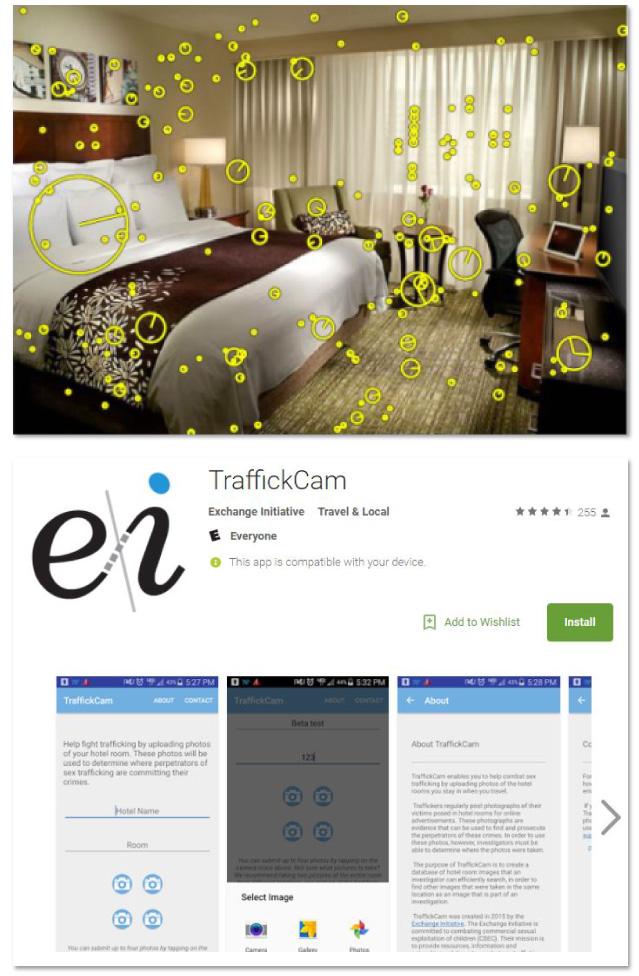
Download Traffickcam App
Stay alert. When traveling, look for signs around you that human trafficking may be taking place—and let authorities know if you see anything suspicious. “Let’s say you’re sitting on an airplane and notice an adult comes in with a child,” says Sister Kathleen Bryant, a member of the board of directors of U.S. Catholic Sisters Against Human Trafficking. “It doesn’t feel familial. The child looks sad, fearful, and is not free to talk.” While you don’t want to profile someone, Bryant suggests privately telling a flight attendant of your suspicions so the flight team can investigate and alert the authorities to meet the plane when it lands, if necessary. Don’t try to rescue someone yourself, she advises. “Leave it to the professionals.”
Be sure to follow The Meeting Professional and the MPI blog throughout 2018 for our ongoing coverage about the toll of human trafficking and what can be done to help victims.
